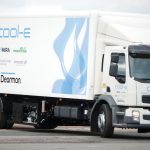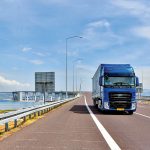Stepping into the future with the UAE

There is no denying that the United Arab Emirates (UAE) is living in the future with its smart cities and innovative approaches to transport and logistics. MARISKA MORRIS investigates
From tall, glimmering buildings to a static ocean liner, which acts as a hotel, the UAE not only looks like a city from the future, but always seems to be one step ahead of the rest of the region. Transport and logistics in the UAE are no exception. The country is not afraid to embrace innovation.
Abu Dhabi, the capital of the UAE, was ranked the top smart city among its Middle East and African peers in a study by McKinsey Global Institute. The study looks at the technology used to increase the quality of life for citizens in terms of healthcare, security, mobility, economic development and housing.
In the category of comprehensive technology base, Abu Dhabi scored 18,4 out of 37 points. Cape Town, the only South African city to be included in the top cities for Africa and the Middle East, scored 10,7. UAE citizens are definitely buying into the smart-city concept with a massive increase in online shopping in the region.
According to Forbes Middle East journalist James Lee, online spending in the UAE is expected to reach US$ 9,8 billion (R147 billion) by the end of 2018. The Fourth Annual Cross-border Commerce report, a joint project between PayPal and Ipsos, predicts this number will continue to increase.
Lee explains: “The increase in online spending is also forecast to continue, with almost half of online adults surveyed stating they will increase their online spending in the next 12 months, citing convenience of shopping online and the rise in available platforms from which to shop as the key reasons for the expected increase.”
This all translates in dollar signs for the fast-moving consumer goods (FMCG) sector of the UAE. Along with smart cities and online shopping comes the consumer demand for on-demand deliveries. Sandhya D’Mello, in an article for Khaleej Times, notes that almost a third of consumers in the UAE use restaurants or meal delivery services on a regular basis.
“Around 49 percent of UAE online consumers opt to eat out on a weekly basis. This is higher than the global average (39 percent) and Africa/Middle East regional average
(32 percent),” D’Mello explains.
The global FMCG online e-commerce is expected to be worth more than US$ 400 billion (R6,03 trillion) by 2020 and will comprise ten to 12-percent market share of all FMCG. There has also been a big investment in some other areas of transport innovation, like the uptake of Uber-like logistics services in the UAE.
The Gulf Cooperation Council (GCC) market, which includes countries like the UAE, Bahrain and Saudi Arabia, is estimated at US$ 35 billion (R526 billion). Transport plays a crucial part of this growth with a million trucks operating across this region, and the number of vehicles increasing by five to nine percent every year.
However, as with many others countries, transport costs are mostly unregulated, which could lead to increasingly expensive transport and logistics costs. While “Uberising” the transport industry is not a new concept, it is very popular in the UAE. Uberising takes place when an industry uses a website, program or mobile application to facilitate peer-to-peer transactions.
TruKKer is an on-demand truck aggregator that operates a full-service trucking company with a fleet of 2 500 vehicles. It currently services over 150 companies in the business-to-business market and moves cargo all over the Middle East and North Africa.
According to an article by Arabian Gazette, the organisation saw a 2 000 percent growth in its first year and has been able to reduce transport costs by between 20 to 30 percent in some instances. This service offers competitive pricing for clients and business for transport operators.
Abhinav Chaudhary, COO of Truxapp, says: “The technology is stabilising the market. It acts as a single point of contact for customers looking for the lowest possible rates, while also ensuring supply of services through peaks and troughs in the market. We give the truck owners the highest uptime for their fleets.”
Despite being located in the global oil region, various transport operators in the UAE are investing in biofuel – something the broader African region hasn’t yet done.
The UAE division of McDonald’s has proved to be a leader in biofuels. In 2011, the fast-food chain made a commitment to recycling its waste cooking oil into biofuel for its vehicles. This year, the McDonald’s biofuel-powered fleet marked ten-million kilometres. Biofuels are more environmentally friendly and extend the engine life of a vehicle, due to the superior lubricity of cooking oil.
The UAE is also focusing on providing an environment ideal for start-up companies. Tax-free economic zones have been around for centuries, but not many countries take full advantage of this initiative aimed at encouraging economic activities through taxing companies very lightly, or not at all. The UAE has a total of 49 tax-free zones that cater for a range of industries including logistics and related services.
The Khalifa Industrial Zone Abu Dhabi (KIZAD) has also launched its 17 000 m2 free-zone warehouses. The units range from 380 to 761 m2 and are ideal for start-up companies. The warehouses are aimed at trading and export, third-party logistics, freight forwarders and distribution companies.
While investment in technology is important for the region, the UAE government is also revising its approach to road safety with a vision of zero fatalities per 100 000 people by 2020. Trucks in the UAE are currently responsible for 11 percent of all accidents in Dubai with 55 percent of these accidents occurring at night.
One approach to addressing road safety is removing the buffer from the speed limits. In the past, drivers could exceed the speed limit by 20 km/h before they were fined. This grace speed has now been removed. While drivers might have to travel more slowly, the adoption of new technology in the UAE is definitely not slowing down any time soon.
Published by
Mariska Morris
focusmagsa




